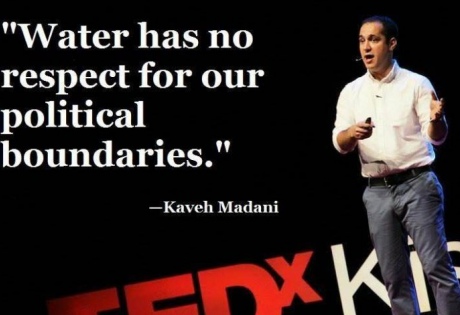Will the next World War be over water?
by Alex Walker
Imperial College lecturer Kaveh Madani's TEDx talk gets international attention
Water is the most essential and pervasive element of life. Yet, this valuable resource is becoming more scarce with climate change, population growth and the increasing demand for food and energy.While theory, science and politicians predict fierce water conflicts and wars over water access and rights, water scarcity provides unique opportunities for cooperation.
In a recent bold and hopeful TEDx talk, Dr Kaveh Madani, Lecturer of Environmental Management at the Centre for Environmental Policy (CEP) at Imperial College London shared a different approach to water crisis and conflicts, one that promotes changing our perspectives and cooperating globally to reduce our water footprint. His talk has received a lot of attention receiving almost 40,000 views within the last week.

As the only child of the parents working in the water sector, Madani "had no choice, but being passionate about water". Growing up in Iran during the Iran-Iraq war and suffering from the Iraq's missile attack to Tehran in 1988 made him determined to build his career in water conflict resolution and peace building. He trained himself in water resources engineering, economics and social sciences to be able to provide solutions that are both theoretically sound and practical.
Kaveh Madani is known internationally for the successful integration of game theory into traditional water resources management. His fundamental contributions have helped the larger water management community realize why traditional water management solutions fail in practice, as water users are often base their decisions on individual rationality as opposed to group rationality. This is, however, not always the case. As Madani discussed in this insightful presentation, his field experiments in the developing parts of the world suggest that cooperation is a strong possibility during water scarcity.
Madani called for attention to the strong linkage of water with other issues such as food, energy, politics, identity, and dignity and suggests that a change in perspective can open doors for trades and cooperation. In his talk, he invited the public to conserve water and think about the rest of the globe and future generations.
He concluded this popular talk with the poem from Saadi Shirazi, an Iranian poet of the 13th century:
"Human beings are members of a whole,
In creation of one essence and soul.
If one member is afflicted with pain,
Other members uneasy will remain.
If you have no sympathy for human pain,
The name of human you cannot retain"
Article text (excluding photos or graphics) © Imperial College London.
Photos and graphics subject to third party copyright used with permission or © Imperial College London.
Reporter
Alex Walker
Centre for Environmental Policy